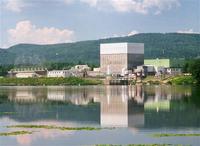-
Safety concerns remain about Westinghouse AP1000 reactor design
The United States and the United Kingdom are yet to approve the latest reactor design from Westinghouse; regulators in both countries are not convinced that the reactor can effectively withstand man-made or natural disasters; these concerns notwithstanding, China is pushing forward with an ambitious nuclear energy program which will see sixty AP1000 reactors built by 2010; the scope and pace of the Chinese program, and the fact that at its core is a reactor with possible design weaknesses, are a cause of more concerns
-
-
Fusion power nears
The long-sought goal of a practical fusion-power reactor has inched closer to reality with new experiments from MIT’s experimental Alcator C-Mod reactor, the highest-performance university-based fusion device in the world; MIT advance helps remove contaminants that slow fusion reactions
-
-
Nuclear power faces waste, weapons proliferation problems
New report concludes that nuclear power will continue to be a viable power source but that the current fuel cycle is not sustainable; due to uncertainty about waste management, any projection of future costs must be built on basic assumptions that are not grounded in real data; the “once-through” policy, mandated by the 1982 Nuclear Waste Policy Act, creates a lot of highly radioactive waste; reprocessing and recycling of spent fuel lessens the waste problem, but significantly increases the risk of weapons proliferation
-
-
Day of using nuclear fusion to generate power from sea water nears
New X-ray imaging capability developed at Sandia National Laboratory may help remove a major impediment in the worldwide, multi-decade, multibillion dollar effort to harness nuclear fusion to generate electrical power from sea water
-
-
Two nuclear reactors shut down Sunday because of problems

Two nuclear reactors — Indian Point nuclear power plant, about twenty-five miles north of New York City, and Vermont Yankee nuclear power plant in Vernon, Vermont — had to be shut down Sunday; Indian Points was shut down because a transformer caught fire, and Vermont Yankee was shut down because radioactive water began leaking from one of its pipes
-
-
Goal of eliminating HEU reactors faces hurdles
To lessen the risk of terrorists getting their hands on bomb-grade materials, the U.S. has led an effort to end the use of highly enriched uranium (HEU) in research reactors around the world; 72 HEU reactors have been modified or shuttered, but various government and academic facilities still operate around 130 HEU reactors — and these operators are reluctant to switch because of the complexities involved in changing to a new technology
-
-
Experts: Stuxnet "a game changer"
EU cybersecurity agency warns that the Stuxnet malware is a game changer for critical information infrastructure protection; PLC controllers of SCADA systems infected with the worm might be programmed to establish destructive over/under pressure conditions by running pumps at different frequencies; Dr. Udo Helmbrecht, chief of EU’s cybersecurity agency: “Stuxnet is a new class and dimension of malware—- The fact that perpetrators activated such an attack tool, can be considered as the ‘first strike’ against major industrial resources. This has tremendous effect on how to protect national [cyber and critical infrastructure] in the future’
-
-
Regulators: N.J. nuclear plant employee was an Islamic jihadist

A 26-year old American, Sharif Mobley, now under arrest in Yemen for terrorist activities, became an Islamic militant while working for six years at several nuclear plants in New Jersey, Pennsylvania, and Maryland; the man — who told fellow workers “We are brothers in the union, but if a holy war comes, look out” — had unescorted access to the interior of the plants; to have unescorted access to secure areas of a nuclear power plant, a person must undergo a background investigation, including a criminal record check and a psychological assessment — but the rules did not account for temporary workers who migrate from plant to plant, as Mobley did
-
-
Nuclear power making a come back
If Germany, where most of the public is suspicious of nuclear power, plans to extend the life of its nuclear reactors, the world must have entered a new atomic age; indeed: around the world, more than 150 reactors with a total net capacity of almost 170,000 megawatts are planned and more than 340 more are proposed, according to the World Nuclear Association
-
-
India's ambitious thorium-based nuclear energy plans
With 40 percent of its population not yet connected to the electricity grid and an economy growing by about 8 percent each year, India’s ambitious 3-stage energy security plan includes exploiting the country’s vast reserves of thorium; India could thus find itself a leading global exporter of an alternative nuclear technology that is more efficient than today’s uranium-plutonium fuel cycle
-
-
Stuxnet, world's first "cyber superweapon," attacks China

Stuxnet, the most sophisticated malware ever designed, could make factory boilers explode, destroy gas pipelines, or even cause a nuclear plant to malfunction; experts suspect it was designed by Israeli intelligence programmers to disrupt the operations of Iran’s nuclear facilities — especially that country’s centrifuge farms and the nuclear reactor in Bushehr; it has now infected Chinese industrial control systems as well; one security expert says: “The Stuxnet worm is a wake-up call to governments around the world—- It is the first known worm to target industrial control systems”
-
-
Livermore scientists to begin fusion quest before end of month
Before the end of the month, scientists at Livermore’s National Ignition Facility will conduct an experiment backed by billions of dollars — and which promises to change the world’s energy supply; the scientists are preparing to meet an end-of-month deadline for the first set of experiments in the final stretch of a national effort to achieve the long-sought goal of fusion — a reaction in which more energy is released than put into it
-
-
MIT: No shortage of uranium for nuclear energy, more research needed
New study challenges the assumption that the world is running out of uranium — and suggests that nuclear power using today’s reactor technology with a once-through fuel cycle can play a significant part in displacing the world’s carbon-emitting fossil-fuel plants, and thus help to reduce the potential for global climate change
-
-
South Africa shelves small nuclear plant scheme
South Africa is shelving the development of a cutting-edge nuclear reactor — Pebble Bed Modular Reactor — after the program failed to find private investors or customers abroad; South Africa was one of the few countries in the world engaged in research on the technology, touted as much safer than earlier generations of nuclear plants
-
-
U.S. nuclear power plants bolster defenses against cyberattacks
The threat to digital systems at the U.S. nuclear power plants is considerable — especially for new nuclear power facilities that would be built in the United States and throughout the world, as control rooms would employ digital systems to operate the plants; these state-of-the-art instruments and systems make them targets for hackers
-
- All
- Regional
- Water
- Biometrics
- Borders/Immig
- Business
- Cybersecurity
- Detection
- Disasters
- Government
- Infrastructure
- International
- Public health
- Public Safety
- Communication interoperabillity
- Emergency services
- Emergency medical services
- Fire
- First response
- IEDs
- Law Enforcement
- Law Enforcement Technology
- Military technology
- Nonlethal weapons
- Nuclear weapons
- Personal protection equipment
- Police
- Notification /alert systems
- Situational awareness
- Weapons systems
- Sci-Tech
- Sector Reports
- Surveillance
- Transportation
Advertising & Marketing: advertise@newswirepubs.com
Editorial: editor@newswirepubs.com
General: info@newswirepubs.com
2010-2011 © News Wire Publications, LLC News Wire Publications, LLC
220 Old Country Road | Suite 200 | Mineola | New York | 11501
Permissions and Policies
Editorial: editor@newswirepubs.com
General: info@newswirepubs.com
2010-2011 © News Wire Publications, LLC News Wire Publications, LLC
220 Old Country Road | Suite 200 | Mineola | New York | 11501
Permissions and Policies
